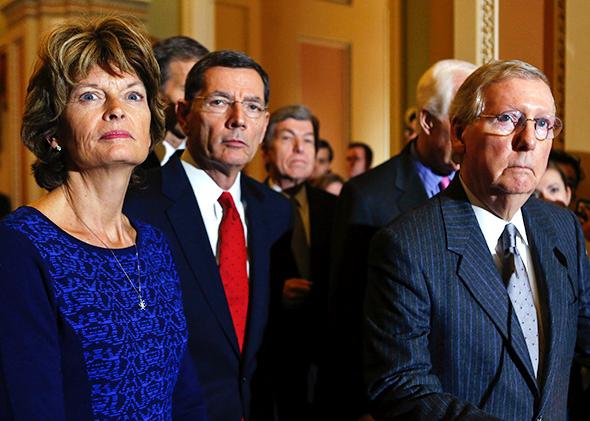To be an elected Republican in the age of Obamacare is to have a single, endless mantra: “Repeal and replace.” Of the two parts, Republicans have had the easiest time with “repeal.” Since winning the majority in 2010, House Republicans have held 56 votes to repeal the Affordable Care Act, with the latest attempt on Tuesday, a courtesy for the new members who haven’t had a chance to voice their ritual distaste for the law.
If you’re feeling charitable, you can treat this focus on “repeal” as a consequence of circumstances. House Republicans could have crafted a bill to replace Obamacare, but then they would have had to make the compromises and pay the costs of building an alternative without the benefit of bringing it to law—as soon as any bill reached the Senate, Democrats would have killed it.
But now, Republicans have all of Congress. If they want to replace Obamacare, they can. And on Wednesday, they took a step in that direction. With little fanfare, Sens. Orrin Hatch of Utah, Richard Burr of North Carolina, and Rep. Fred Upton of Michigan unveiled their blueprint for Republican health reform. Called the “Patient Choice, Affordability, Responsibility and Empowerment Act,” it is mostly identical to an outline released last year by Hatch, Burr, and now-retired Sen. Tom Coburn.
The centerpiece of that plan was a modest cap on the employer-sponsored insurance tax break that began at 65 percent of the average comprehensive plan. For this year, they’ve replaced it with a tax on health benefits. “Workers,” notes the New York Times in its description of this year’s proposal, “would have to pay federal income tax on the value of employer-provided health benefits that exceed certain annual thresholds—$12,000 for individuals and $30,000 for families.”
The remaining provisions are similar to the ones in last year’s proposal. The GOP plan would allow consumers to purchase insurance regardless of pre-existing conditions, as long as they were continually insured. For Americans who don’t have insurance, the plan would provide a one-time enrollment period. Like Obamacare, the replacement proposal includes subsidies for low- and middle-income Americans, but in the form of tax credits instead of a payment to the insurer. But these would be much less generous, with a threshold well below the one established by the ACA. The Republican plan eliminates the federal exchanges and ends regulation of insurance benefits, allowing—for example—an insurer to offer a comprehensive plan that didn’t include maternity coverage.
The largest changes come to Medicaid. Under their plan, Republicans would end the expansion, and replace it with an allotment based on the number of poor in each state. At most, states could use these new funds on pregnant women, children, and the disabled. Young adults can stay on their parents’ insurance plans until they turn 26, and the ban on lifetime coverage limits remains. And for young people who purchase insurance, it’s cheaper; the GOP will allow insurers to charge older customers up to five times the amount they charge for their younger counterparts.
The consequences of the proposal are straightforward: By ending Obamacare in its entirety and placing limits on Medicaid, it would eliminate insurance for millions of Americans and make it harder for middle- and working-class people to purchase coverage. And while it’s described as a plan to save money, the truth is that it accomplishes this by reducing care for the poor and raising costs on everyone else.
In other words, this isn’t a plan to achieve universal coverage. That’s simply not a Republican goal, and it’s part of the reason it has proven politically difficult to craft an alternative. We don’t think everyone should have health insurance just isn’t an appealing message. Which gets to something important about this whole enterprise: The CARE Act is a blueprint. There is no legislation to score or any bill to debate. It’s just a package of ideas—one approach for when, or if, the party decides to pass a genuine alternative to Obamacare.
Put differently, it’s probably a dead letter. Even when there were no costs to action last year, Republicans couldn’t manage to get behind a proposal. And while there’s a chance the party needs to act to repair the health care system—if it takes a blow from the Supreme Court—it’s not at all clear that the party is willing to agree to the trade-offs it takes to actually craft and pass a bill, and not just talk about one.
The simple fact is that Democrats paid a huge electoral cost for their willingness to upend the health care system and pursue comprehensive reform. Arguably, it’s the whole reason Republicans are even in a position to debate repeal and replace. The real question for Republicans isn’t whether they’ll have a plan—if they’re serious and sincere, lawmakers will build one the party can agree to. The real question is whether they’ll sacrifice their political success to the burden of reform.
